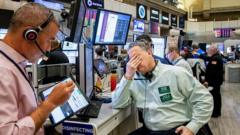As Donald Trump's tariffs on imports from around the world take effect, the US government bond market is experiencing a significant sell-off, raising concerns about the health of the economy and the potential for a recession.**
US Economy Faces Turmoil as Trump Tariffs Trigger Debt Market Sell-Off**

US Economy Faces Turmoil as Trump Tariffs Trigger Debt Market Sell-Off**
Concerns over rising tariffs lead to sharp bond yield increases, causing investors to flee US government debt.**
Confidence in the US economy is rapidly declining, as investors react to the implementation of Donald Trump's tariffs by selling off government debt en masse. This has resulted in a sharp spike in interest rates for US bonds, which have historically been regarded as a secure investment in times of economic uncertainty.
The new tariffs, which are levied on goods imported from approximately 60 countries, went into effect at midnight, coinciding with escalating tensions in a trade war with China. Following a monumental 104% tariff imposed on Chinese imports, China retaliated with an 84% tax on American products. The fallout from these measures has led to significant declines in stock markets over the past several days.
The sale of US Treasury bonds—essentially governmental IOUs—poses a grave challenge for the world's largest economy, as these bonds are typically bought as a safe investment. On Wednesday, yields on US bonds surged to their highest levels since February, hitting 4.5%. This increase makes borrowing more costly for the US. While the rate was at a similar level a few months ago, the yield for 10-year US borrowing surged from 3.9% in just 48 hours.
Analysts are suggesting the Federal Reserve may need to intervene if market instability persists. George Saravelos, global head of FX research at Deutsche Bank, noted that emergency purchases of US Treasuries may be necessary to stabilize the bond market. "We are entering uncharted territory," he warned, indicating uncertainty in how markets will respond in the upcoming days, particularly given the bond market's implications of a waning trust in US assets.
Amid increasing pressure, Simon French, chief economist at Panmure Gordon, remarked that the Fed could opt to lower interest rates to protect American jobs by easing business borrowing costs as they face mounting expenses due to tariffs. The prospect of a recession is becoming more pronounced, with JP Morgan raising the odds from 40% to 60%, signaling that US policy is beginning to diverge from pro-growth initiatives.
Trump’s tariffs threaten to disrupt global supply chains, placing an added burden on American firms importing foreign goods, who will be responsible for the taxes. This raises the potential for increased inflation as companies may pass the costs onto consumers. While Trump asserts that these tariffs are necessary for bolstering domestic manufacturing and protecting American industries, the ripple effects continue to be felt across the economy.
The question now looms regarding which investors are offloading US bonds, with speculation that foreign entities such as China—holding approximately $759 billion in US debt—could be liquidating their positions. Saravelos warned, "There is little room now left for an escalation on the trade front. The next phase risks being an outright financial war involving Chinese ownership of US assets," emphasizing the detrimental effect such a conflict could have on the global economy.




















